|
|
|
Sort Order |
|
|
|
Items / Page
|
|
|
|
|
|
|
| Srl | Item |
| 1 |
ID:
106026
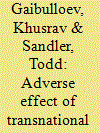

|
|
|
|
|
| Publication |
2011.
|
| Summary/Abstract |
This article investigates the adverse effects of domestic and transnational terrorism on income per capita growth for 51 African countries for 1970-2007, while accounting for cross-sectional (spatial) dependence and conflict (i.e. internal conflicts and external wars). The findings of the fixed-effects panel estimator suggest that transnational terrorism has a significant, but modest, marginal impact on income per capita growth. These results hold for two different terrorism event datasets. However, domestic terrorist events do not affect income per capita growth. Our findings differ from those in an earlier study on the impact of transnational terrorism on African growth, because we uncover a much more moderate effect. In our study, regional impacts and terrorism-conflict interactions effects are also distinguished. Moreover, our sample countries and period are more extensive. Our article contains a host of robustness checks involving macroeconomic and political variables that find virtually identical results. Alternative terrorist variables are also used, with little qualitative change in the findings. The absence of a domestic terrorism impact is surprising because there were many more domestic than transnational terrorist incidents in Africa. To promote growth, host and donor countries must direct scarce counter-terrorism resources to protect against transnational terrorism in particular. The modest impact of transnational terrorism on African growth means that developing countries' economies have been more resilient to terrorism than has been generally thought.
|
|
|
|
|
|
|
|
|
|
|
|
|
|
|
|
| 2 |
ID:
128871


|
|
|
|
|
| Publication |
2014.
|
| Summary/Abstract |
This article presents an eclectic review of the analytical study of terrorism that views all agents as rational decisionmakers. This analytical literature began in earnest with the seminal study of US skyjackings by William Landes in 1978. After 11 September 2001, the analytical literature on terrorism grew rapidly. Based on policy relevance, my survey article identifies five key areas of intense research interests. These include analyses of terrorist attack trends, the economic consequences of terrorism, the study of counterterrorism effectiveness, the causes of terrorism, and the relationship of terrorism and liberal democracies. New developments in the field focused on distinguishing key differences between domestic and transnational terrorism. Additionally, recent game-theoretic advances permitted more active agents and stages to the games. Other major developments involved the study of networked terrorists and the role of counterterrorism foreign aid. Fruitful future directions include using advanced econometric methods to discern the true impact of terrorism on growth, applying spatial econometrics to the study of terrorism, ascertaining the determinants of terrorist groups' longevity, and learning how to foster international counterterrorism cooperation.
|
|
|
|
|
|
|
|
|
|
|
|
|
|
|
|
| 3 |
ID:
166203


|
|
|
| 4 |
ID:
107552


|
|
|
|
|
| Publication |
2011.
|
| Summary/Abstract |
We use the Hsiao-Granger method to test for terrorism-growth causality for seven Western European countries. In bivariate settings, the impact of economic performance on domestic terrorism is very strong. In trivariate settings, the impact of performance on terrorism diminishes. In general, we find that economic performance leads terrorist violence in robust ways only for three out of seven countries. Terrorism is almost never found to causally influence growth in bivariate and trivariate specifications. Our findings indicate that the role of economic performance in determining terrorist violence appears to have been important for some countries, whereas all attacked economies have been successful in adjusting to the threat of terrorism.
|
|
|
|
|
|
|
|
|
|
|
|
|
|
|
|
| 5 |
ID:
155020
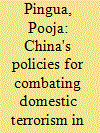

|
|
|
|
|
| Summary/Abstract |
Today, ethnic separatism, religious extremism and terrorism pose a serious challenge to the integrity and unity of China. By upgrading and enhancing the economic status of the Uyghur, Beijing hopes to undermine their demand for an independent homeland. Pooja Pingua analyses China’s policies for combating domestic terrorism in Xinjiang.
|
|
|
|
|
|
|
|
|
|
|
|
|
|
|
|
| 6 |
ID:
169918


|
|
|
|
|
| Summary/Abstract |
This study explores differences in perpetrators of suicide attacks and non-suicide attacks in the United States. The study uses data on far-right and Al Qaeda and affiliated/inspired terrorists between 1990 and 2013 from the United States Extremist Crime Database. Our analysis estimates logistic regression models to test whether suicide attackers were more likely to have exhibited specific risk factors for suicidality, while examining other prominent claims regarding patterns of suicide terrorism. Suicide attackers were no more likely than non-suicide attackers to have previously attempted suicide or to have been diagnosed as mentally ill. Suicide attackers were more likely, though, to have a history of substance abuse, to be loners, have served in the military, participated in paramilitary training, and be more ideologically committed to the cause. We found that Al Qaeda affiliated/inspired attackers were more likely than far-right attackers to have engaged in a suicide mission. With the current focus on Americans traveling to Syria and Iraq to receive training and fight for jihadist movements (e.g., the Islamic State), our findings appear relevant. Observers have expressed concern that these fighters may return and then commit attacks in their homeland. Law enforcement could make use of this study’s findings.
|
|
|
|
|
|
|
|
|
|
|
|
|
|
|
|
| 7 |
ID:
092049


|
|
|
|
|
| Publication |
2009.
|
| Summary/Abstract |
This article takes a closer look at the relationship between democracy and transnational terrorism. It investigates what it is about democracies that make them particularly vulnerable to terrorism from abroad. The authors suggest that states that exhibit a certain type of foreign policy behavior, regardless of their regime type, are likely to attract transnational terrorism. States that are actively involved in international politics are likely to create resentment abroad and hence more likely to be the target of transnational terrorism than are states that pursue a more isolationist foreign policy. Democratic states are more likely to be targeted by transnational terrorist groups not because of their regime type per se but because of the type of foreign policy they tend to pursue. The empirical analysis provides support for the argument.
|
|
|
|
|
|
|
|
|
|
|
|
|
|
|
|
| 8 |
ID:
166674
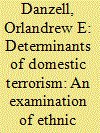

|
|
|
|
|
| Summary/Abstract |
Many scholars have sought to explain why countries with ethnically heterogeneous populations experience higher levels of political violence, but these studies have produced mixed findings. Unlike most studies that use ethno-linguistic fractionalization indices to examine this relationship, we argue that ethnic polarization is a more appropriate measure to assess the role of ethnicity as a causal factor of domestic terrorism. This paper hypothesizes that high ethnic polarization influences the incidence of domestic terrorism, particularly when intervening economic factors are present. To test three hypotheses, we use negative binomial regression to model data from the Global Terrorism Dataset, World Bank, and the Reynal-Querol (RQ) ethnic polarization index of 116 countries between 1970 and 2012. Our findings show that terrorism is more likely to emerge in societies with high ethnic polarization and economic malaise.
|
|
|
|
|
|
|
|
|
|
|
|
|
|
|
|
| 9 |
ID:
138776
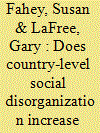

|
|
|
|
|
| Summary/Abstract |
This study examines the effects of a measure of country-level social disorganization on levels of terrorist attacks and fatalities in 101 countries from 1981 to 2010. We measure social disorganization as the presence of state instability: revolutionary and ethnic war, adverse regime change, and genocide. The classic social disorganization perspective posits that individuals experiencing these types of rapid social change will be freed from the institutional and informal restraints that bind them to society, and keep them conforming to social norms and laws. We examine the extent to which this reasoning applies to the number of terrorist attacks and fatalities from terrorist attacks occurring in countries. To control for the possibility that better functioning states are better able to prevent terrorist attacks, we include two measures of state capacity. We find that controlling for state capacity and a wide variety of other variables, social disorganization is consistently associated with increases in terrorist attacks and fatalities. We consider implications of the results for future research and policy.
|
|
|
|
|
|
|
|
|
|
|
|
|
|
|
|
| 10 |
ID:
175744
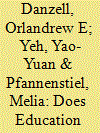

|
|
|
|
|
| Summary/Abstract |
Policymakers often tout expanded access to education as an antidote for terrorism in Africa. Targeted economic development is also considered a necessary complement to education gains because young, well-educated individuals who lack viable opportunities are vulnerable targets of radicalization. Despite common assertions that poor socioeconomic circumstances drive radicalization, empirical research has hitherto neglected critical inquiry of these policies. Varied findings across cross-national studies of education expansion and the effects of burgeoning youth cohorts warrant a focused examination of regions plagued by the proliferation of extremist groups. This study explores the role of education in mitigating a turn to terror among youth in Africa by examining 50 countries from 1970 to 2011. Expansions in primary, secondary, and tertiary education appear to have different influences on domestic terrorism. In the sub-Saharan region, one model shows primary and secondary education reduced terrorism while others indicate non-monotonic effects in societies experiencing a youth bulge. These nuanced findings suggest education should not be relied upon to counter extremism without additional initiatives to facilitate socioeconomic opportunities. The implication of this paper’s findings are important for academics and policymakers eager to create stable polities across the African continent.
|
|
|
|
|
|
|
|
|
|
|
|
|
|
|
|
| 11 |
ID:
138076
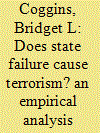

|
|
|
|
|
| Summary/Abstract |
A developed-world consensus ties state failure to new and serious international insecurity. But that conclusion rests upon an uncertain foundation; insights into the nature and intensity of failure-related threats remain tentative and unsystematic. This study begins to remedy the problem, examining the broad relationships between weakness, failure, and terrorism with panel data for 153 countries (1999–2008). I argue that the quantitative literature too often disregards the political context determining terrorism’s use, that terrorism is endogenous to many measures of state failure, and that estimates of the failure-related threat of terrorism are overstated. Consistent with these expectations, I find that most failing and failed states are not predisposed to terrorism. However, among the ‘‘most failed’’ states, those at war or experiencing political collapse are significantly more likely to experience and produce terror. These results refine the relationship between failure and external threat and highlight the importance of terrorism’s macro-level political context.
|
|
|
|
|
|
|
|
|
|
|
|
|
|
|
|
| 12 |
ID:
160212
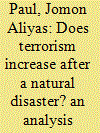

|
|
|
|
|
| Summary/Abstract |
Does an emergency such as a natural disaster lead to a surge of terrorism? This paper contributes to the emerging literature on this issue. We consider the experience of 129 countries during the period 1998–2012 to determine the effect of a natural disaster on both domestic as well as transnational terrorism. We also control for endogeneity using expenditure on health care and land area in a country as instruments. In contrast to the existing literature, we measure the extent of terrorism by the value of property damage. The results indicate that after natural disasters, (a) transnational terrorism increases with a lag, and (b) a statistically significant impact on domestic terrorism is not observed.
|
|
|
|
|
|
|
|
|
|
|
|
|
|
|
|
| 13 |
ID:
126018
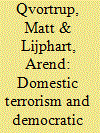

|
|
|
|
|
| Publication |
2013.
|
| Summary/Abstract |
Using logistic regression on the 36 democracies studied in Lijphart's Patterns of Democracy, we find statistically significant correlations between the index of consensus democracy and a higher incidence of fatal domestic terror incidents in the period 1985-2010. We further find that the risk of fatal terrorist attacks is almost six times higher in majoritarian democracies than in their consensus counterparts, and that this indicator is stronger than factors such as economic development and a large youth population and levels of urbanisation.
|
|
|
|
|
|
|
|
|
|
|
|
|
|
|
|
| 14 |
ID:
191014


|
|
|
|
|
| Summary/Abstract |
Since the 1990s, credit rating agencies have played a prominent financial role in developing countries, rating their sovereign bonds and determining capital costs. Over much the same years, domestic terrorism has expanded, increasing market disruptions in countries. Despite the heightened costs related to rebel attacks, few studies investigate the impact of domestic terrorism on bond ratings. Using a sample of seventy-one developing countries between 1996 and 2018, we find that domestic terrorist incidents result in sovereign bond downgrades for countries that receive ratings. Further, when we disaggregate terrorist events by target type, we observe that attacks directed at the government, military and police, business, non-governmental organizations, and private citizens/property have a larger effect than other terrorist incidents. We argue that specific domestic terrorist attacks increase economic instability, leading to capital flight, and a shifting of resources from productive economic sectors to counterterrorism. The resulting economic changes weaken a country’s economy and increase debt nonpayment risk.
|
|
|
|
|
|
|
|
|
|
|
|
|
|
|
|
| 15 |
ID:
164160
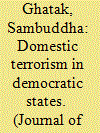

|
|
|
|
|
| Summary/Abstract |
Scholars continue to disagree on the relationship between regime type and political violence, perhaps because the empirical evidence remains contradictory. To date, most studies generally explore the direct relationship between democracy and terrorism. Yet, we think the effect of regime type on terrorism is conditional on the presence of politically excluded groups whose grievances motivate them to challenge the state. We need to take into account both willingness/grievance and opportunity to understand political violence. Using a global data set of domestic terrorism between 1990 and 2012, we find that different regime-associated features of democracy relate differently to domestic terrorism. Higher levels of the rule of law tend to decrease terrorism, whereas electoral democracies tend to experience more domestic terrorism. However, domestic terrorism increases in every form of democracy in the presence of political exclusion. As such, an effective counterterrorism policy must address underlying grievances as democratization by itself may actually drive domestic terrorism up.
|
|
|
|
|
|
|
|
|
|
|
|
|
|
|
|
| 16 |
ID:
128242


|
|
|
|
|
| Publication |
2013.
|
| Summary/Abstract |
In recent Nigeria, the domestic terrorism of the Islamic group popularly known as 'Boko Haram' is hard to ignore. Almost everyday, television broadcast of the latest news, newspapers, magazines, and websites running and re-running pictures of dramatic and incessant acts of violence carried out by these ferocious group. Major initiatives to combat the nuclear proliferation and domestic terrorist threats posed by the 'Boko Haram' group have been launched by the Federal Government and international security institutions. In fact, considerable amount of money and political capital have been committed to new and continuing programmes to enhance nuclear security. Although, these and other efforts are worthy of support, it is not obvious that they reflect any clear ordering of priorities, or that they are being implemented with a sense of urgency. In order to correct this situation, this paper explicates the issue of Boko Haram domestic terrorism in Nigeria, taking an in-depth look at the historical antecedents, motivations, objectives and structures that can help in preventing them. This paper concludes with the advocacy of how citizens can assist in checking the menace of Boko Haram crises in the country in order to tackle these monstrous groups whose callous activities have become a hydra in Nigeria.
|
|
|
|
|
|
|
|
|
|
|
|
|
|
|
|
| 17 |
ID:
128985
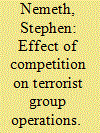

|
|
|
|
|
| Publication |
2014.
|
| Summary/Abstract |
Scholars have long accepted the contention that competition among terrorist organizations raises the level of violence used by the competitors. This article discusses this claim and advances another-that competition among terrorist organizations creates incentives to use less violence. Using insights from the organizational ecology literature-namely that competition occurs within "species"-I create a variable that assesses intraspecies competition. I test both claims using a data set of domestic terrorism created from the Global Terrorism Database (GTD) for the years 1970 to 1997. I find support for the hypothesis that competition leads to more terrorism, validating the claims of outbidding theorists. Furthermore, ideologies have differential effects on whether outbidding occurs, with nationalist and religious terrorist groups responding to competition with more terrorism and left-wing organizations responding with less.
|
|
|
|
|
|
|
|
|
|
|
|
|
|
|
|
| 18 |
ID:
188041


|
|
|
|
|
| Summary/Abstract |
The past three decades have seen an increase in both domestic terrorist attacks and loans issued by the International Monetary Fund (IMF). In this study, we investigate the connection between IMF loan arrangements and domestic terrorism. We find that countries under IMF loans tend to observe fewer domestic terrorist incidents, especially when the borrowers are democracies. We contend that, while the IMF pressures borrower countries to prevent money laundering and combat the financing of terrorism, this effect is most pronounced in democracies, whose large selectorates incentivize the provision of public goods in a manner that works to reduce domestic terrorism. Our research shows how domestic and international institutions together can possibly help lower incidents of domestic terrorism.
|
|
|
|
|
|
|
|
|
|
|
|
|
|
|
|
| 19 |
ID:
143599
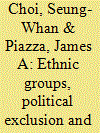

|
|
|
|
|
| Summary/Abstract |
This study examines whether the exclusion of ethnic groups from political power is an important contributing factor to domestic terrorism. To empirically test this question, we employ a negative binomial regression estimation on 130 countries during the period from 1981 to 2005. We find that countries in which certain ethnic populations are excluded from political power are significantly more likely to experience domestic terrorist attacks and to suffer from terrorist casualties; furthermore, ethnic group political exclusion is a more consistent and substantive predictor of domestic terrorist activity than general political repression or economic discrimination.
|
|
|
|
|
|
|
|
|
|
|
|
|
|
|
|
| 20 |
ID:
129516


|
|
|
|
|
|
|
|